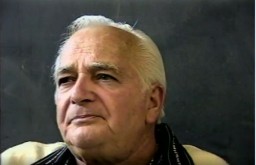You searched for: jewish
<< Previous | Displaying results 2361-2370 of 2504 for "jewish" | Next >>
-
Alan Zimm describes liberation from Bergen-Belsen
Oral HistoryThe Germans occupied Kolo in 1939. In 1942 Alan was deported to the Lodz ghetto where he worked in food distribution. He took food each day to Mordechai Chaim Rumkowski, chairman of the Jewish council. In 1944 Alan was forced to unload trainloads of coal and munitions in Czestochowa. In 1945 he was sent to the Dora-Mittelbau camp. As the Soviet army advanced, the inmates were transferred to Bergen-Belsen, where British forces liberated them in April.
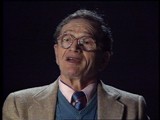
-
Niels Bamberger describes the German invasion of Denmark in 1940
Oral HistoryNiels was raised in a religious Jewish household. In 1932, the family fled to Copenhagen, Denmark, where Niels's father opened an antique store in the mid-1930s. The Germans invaded Denmark in April 1940, but to Niels, little seemed to change during three years of occupation. Upon hearing of German plans to round up Jews in October 1943, Niels and his family decided to flee. A member of the resistance took them to the fishing village of Snekkersten, from where they were able to cross by boat to Sweden.…
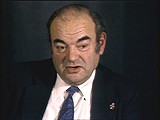
-
Hana Mueller Bruml recalls the occupation of Prague
Oral HistoryIn 1942, Hana was confined with other Jews to the Theresienstadt ghetto, where she worked as a nurse. There, amid epidemics and poverty, residents held operas, debates, and poetry readings. In 1944, she was deported to Auschwitz. After a month there, she was sent to Sackisch, a Gross-Rosen subcamp, where she made airplane parts at forced labor. She was liberated in May 1945.
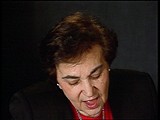
-
Joseph Maier describes Hermann Göring at Nuremberg
Oral HistoryJoseph immigrated to the United States in 1933 after finishing university in Leipzig. His parents and brother had left Germany earlier for the United States. Joseph attended Columbia University. From 1940 to 1943 he was assistant editor for a New York German-Jewish newspaper. In 1944, he worked in the American embassy in Britain as a propaganda analyst. He went to Nuremberg, Germany, as an interpreter in 1946. He analyzed materials and transcripts, and participated in many interrogations for the Nuremberg…
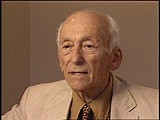
-
Joseph Maier describes Hjalmar Schacht at the Nuremberg trial
Oral HistoryJoseph immigrated to the United States in 1933 after finishing university in Leipzig. His parents and brother had left Germany earlier for the United States. Joseph attended Columbia University. From 1940 to 1943 he was assistant editor for a New York German-Jewish newspaper. In 1944, he worked in the American embassy in Britain as a propaganda analyst. He went to Nuremberg, Germany, as an interpreter in 1946. He analyzed materials and transcripts, and participated in many interrogations for the Nuremberg…
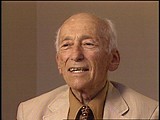
-
Joseph Maier describes former Auschwitz commandant Rudolf Hoess at the Nuremberg trial
Oral HistoryJoseph immigrated to the United States in 1933 after finishing university in Leipzig. His parents and brother had left Germany earlier for the United States. Joseph attended Columbia University. From 1940 to 1943 he was assistant editor for a New York German-Jewish newspaper. In 1944, he worked in the American embassy in Britain as a propaganda analyst. He went to Nuremberg, Germany, as an interpreter in 1946. He analyzed materials and transcripts, and participated in many interrogations for the Nuremberg…
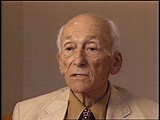
-
Martin Spett describes a massacre of Tarnow Jews
Oral HistoryThe Germans occupied Tarnow in 1939. In 1940 Martin and his family were forced out of their apartment. During the first massacre of Jews, Martin hid in an attic. The family hid during two more roundups. In May 1943 they were registered, allegedly to be exchanged for German prisoners of war, because Martin's mother was born in the United States. They were taken by train to Krakow and then to the Bergen-Belsen concentration camp. Martin was liberated in 1945 and he moved to the United States in 1947.
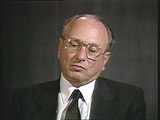
-
Morris Kornberg describes arrival at Auschwitz
Oral HistoryMorris grew up in a very religious Jewish household and was active in a Zionist sports league. When the Germans invaded Poland in September 1939, Morris's town was severely damaged. Morris's family was forced to live in a ghetto, and Morris was assigned to forced labor. After a period of imprisonment in Konskie, a town about 30 miles from Przedborz, Morris was deported to the Auschwitz camp. He was assigned to the Jawischowitz subcamp of Auschwitz. In January 1945, Morris was forced on a death march and…
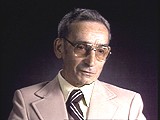
-
Lilly Appelbaum Malnik describes death march from Auschwitz to Bergen-Belsen
Oral HistoryGermany invaded Belgium in May 1940. After the Germans seized her mother, sister, and brother, Lilly went into hiding. With the help of friends and family, Lilly hid her Jewish identity for two years. But, in 1944, Lilly was denounced by some Belgians and deported to Auschwitz-Birkenau via the Mechelen camp. After a death march from Auschwitz, Lilly was liberated at Bergen-Belsen by British forces.
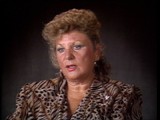
-
Gary Bigus describes Berlin during the 1936 Olympics
Oral HistoryGary (Gerhard) was born in Berlin, Germany, in 1924. His father owned a men’s clothing store. As a child, Gary faced antisemitism from his peers. His family’s store was boycotted several times, and ultimately destroyed in 1938 during Kristallnacht. As the city prepared for tourists to arrive in Berlin for the 1936 Olympics, Gary noticed anti-Jewish signs vanish from storefronts. In 1939, Gary and his parents escaped Germany after securing passage to Shanghai, China. His father died of illness in…
